Archive
Peak memory transfer rate is best SPECint performance predictor
The idea that cpu clock rate is the main driver of system performance on the SPEC2006 cpu benchmark is probably well entrenched in developers’ psyche. Common knowledge, or folklore, is slow to change. The apparently relentless increase in cpu clock rate, a side-effect of Moore’s law, stopped over 10 years ago, but many developers still behave as-if it is still happening today.
The plot below shows the SPEC cpu integer performance of 4,332 systems running at various clock rates; the colors denote the different peak memory transfer rates of the memory chips in these systems (code and data).
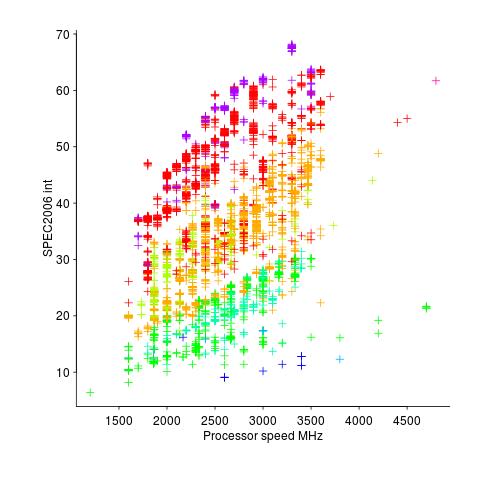
Fitting a regression model to this data, we find that the following equation predicts 80% of the variance (more complicated models fit better, but let’s keep it simple):

where: Processor.MHz is the processor clock rate, memrate the peak memory transfer rate and memfreq the frequency at which the memory is clocked.
Analysing the relative contribution of each of the three explanatory variables turns up the surprising answer that peak memory transfer rate explains significantly more of the variation in the data than processor clock rate (by around a factor of five).
If you are in the market for a new computer and are interested in relative performance, you can obtain a much more accurate estimate of performance by using the peak memory transfer rate of the DIMMs contained in the various systems you were considering. Good luck finding out these numbers; I bet the first response to your question will be “What is a DIMM?”
Developer focus on cpu clock rate is no accident, there is one dominant supplier who is willing to spend billions on marketing, with programs such as Intel Inside and rebates to manufacturers for using their products. There is no memory chip supplier enjoying the dominance that Intel has in cpus, hence nobody is willing to spend the billions in marketing need to create customer awareness of the importance of memory performance to their computing experience.
The plot below shows the SPEC cpu integer performance against peak memory transfer rates; the colors denote the different cpu clock rates in these systems.
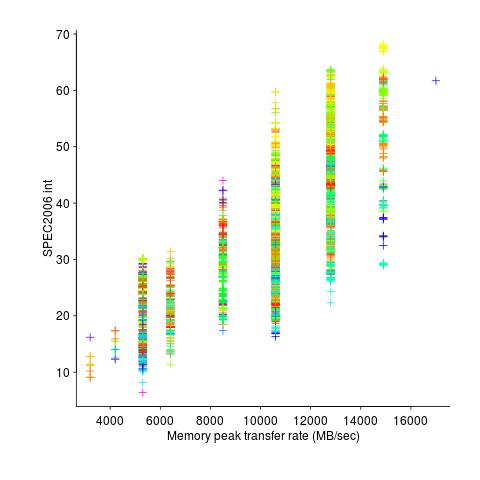
Honking the horn for go faster memory (over go faster cpus)
I have been doing some analysis of computer performance, as measured by the results of the SPEC 2006 int benchmark (i.e, no floating point). As the following plot shows, computers are continuing to get faster (code and data):
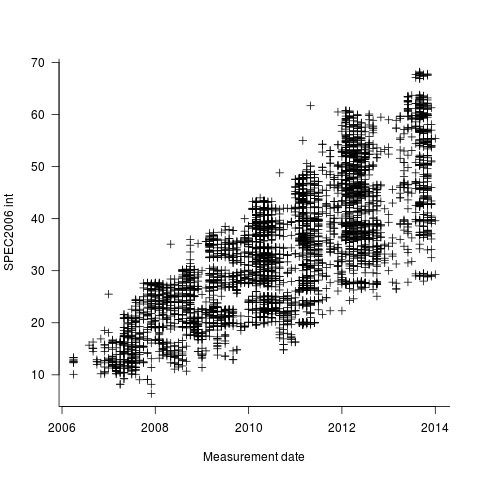
I think the widening spread of results might have a lot to do with companies slowly migrating to the newer benchmark, increasing the range of test cases; there mus also be an element of an increasing range of computer performance on offer from vendors now we have reached the good-enough point.
In the last century the increase in performance was strongly correlated with increasing cpu clock speed. As the following plot shows, this century is different (in years to come the first few years, where this correlation quickly died out, will be treated as a round-off error); performance is more likely to be higher at a higher clock rate, but far from guaranteed:
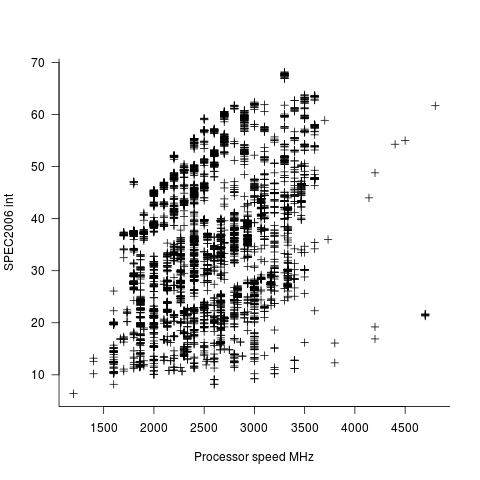
One of the reasons for this change is that, for many tasks, cpus are now seriously performance limited by memory bandwidth, and so these days a lot of the performance improvement is coming from faster memory (yes, it is really about shifting more bytes per clock tick, but a common faster/slower vocabulary keeps things simpler). The following plot uses PC2 (blue) and PC3 (red) module numbers:
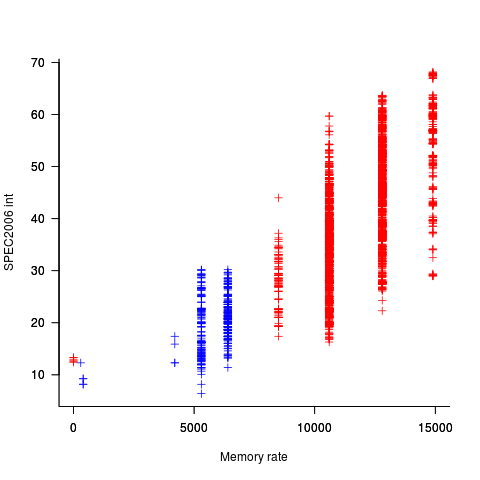
Making use of go faster memory is not as straight-forward as using a go faster cpu. Memory chip configuration includes more tuning options than cpus, which just need a faster clock. That spread in performance, for a given memory rate can probably be traced to use of different options and of course cpu caches play an important part in improving performance. The SPEC results do contain lots of descriptive details about cache characteristics, but extracting it will be fiddly and analysing this kind of stuff always makes my head hurt.
The computer buying public have learned that higher clock rate is better. Unfortunately they still think this applies to cpus when they should now be asking about memory speed. When I ask people about the speed of memory in their computer I am usually told how many gigabytes it has, or get the same kind of look I used to get many years ago when asking about cpu speed.
Recent Comments